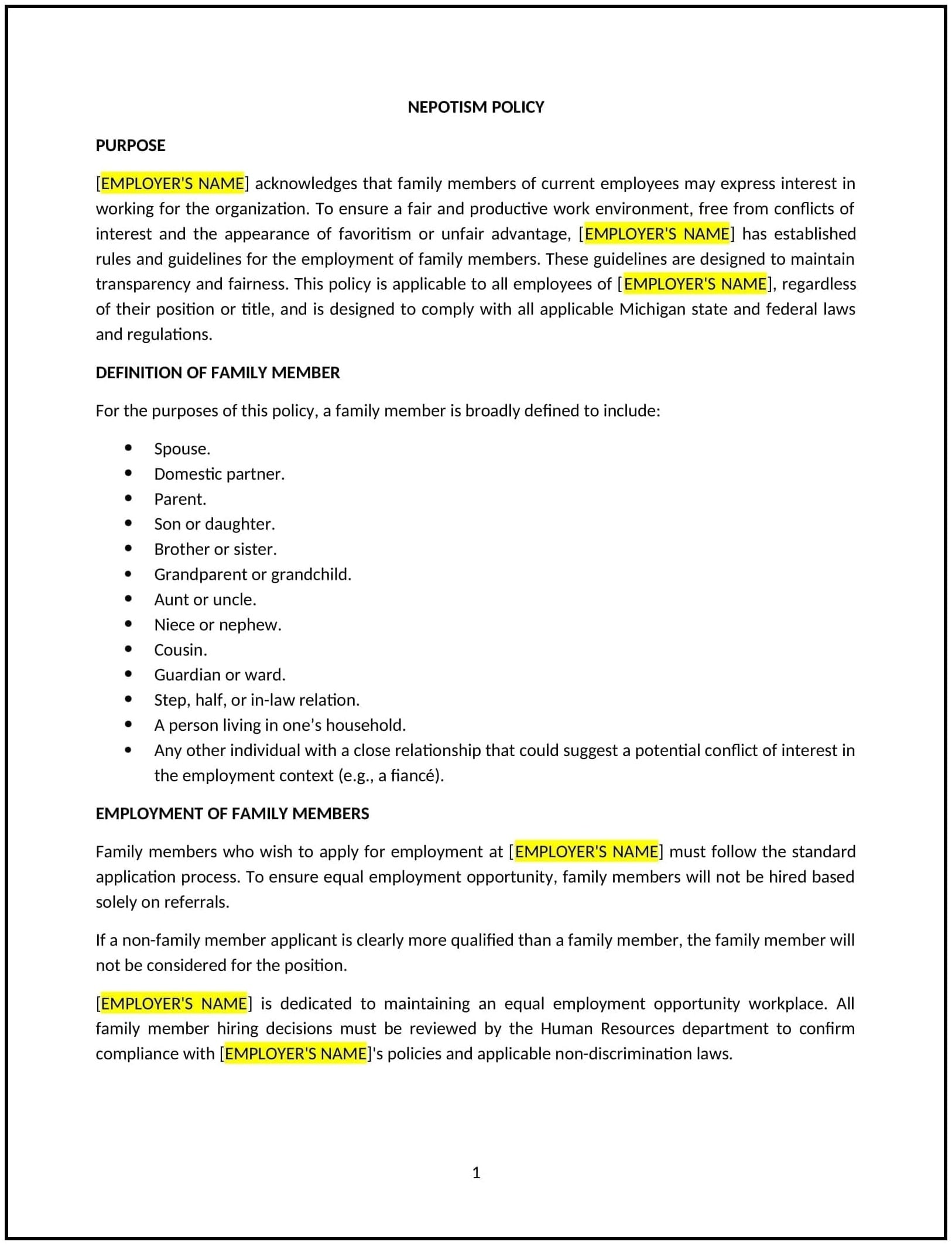Got contracts to review? While you're here for policies, let Cobrief make contract review effortless—start your free review now.

Customize this template for free
Nepotism policy (Michigan)
A nepotism policy provides Michigan businesses with guidelines on the hiring, promotion, and management of family members within the organization. This policy aims to ensure fairness and transparency in the hiring process, minimize conflicts of interest, and prevent any potential perceptions of favoritism. It outlines the procedures for disclosing family relationships and how those relationships will be managed to avoid any negative impact on business operations.
By adopting this policy, businesses can create a more professional and equitable work environment, build trust among employees, and avoid any legal or ethical issues that could arise from nepotism.
How to use this nepotism policy (Michigan)
- Define family relationships: Clearly define what constitutes a family member in the context of the policy, including relationships such as spouses, parents, children, siblings, in-laws, and other extended family members.
- Establish guidelines for hiring family members: Specify the circumstances under which family members may be hired within the business, including any restrictions on hiring for positions where one family member would directly report to another or be in a position to influence decisions involving the other.
- Address promotions and transfers: Outline the rules for promoting or transferring family members within the organization, ensuring that promotions are based on merit and not influenced by personal relationships.
- Disclosure requirements: Require employees to disclose any family relationships that may create a conflict of interest, either at the time of hiring or if family relationships change during employment. This helps businesses identify potential issues early and manage them appropriately.
- Mitigate conflicts of interest: Specify procedures for managing situations where family members work in the same department or have decision-making authority over each other, such as implementing oversight or separating duties to avoid conflicts of interest.
- Set clear reporting lines: Ensure that family members do not work directly under one another or in positions where one could have direct authority over the other. If this is unavoidable, the policy should outline how to manage such situations, such as through third-party oversight or adjusting reporting structures.
- Review the policy regularly: Periodically review the policy to ensure it remains effective and up to date with any changes in Michigan state laws, industry practices, or company needs.
Benefits of using this nepotism policy (Michigan)
This policy provides several key benefits for Michigan businesses:
- Promotes fairness and transparency: The policy ensures that all employees are treated equally, regardless of family relationships, and that decisions regarding hiring, promotions, and transfers are made based on merit and qualifications.
- Reduces conflicts of interest: By addressing potential conflicts of interest upfront, businesses can avoid situations where personal relationships may influence business decisions or create ethical dilemmas.
- Builds trust and credibility: A clear nepotism policy fosters trust among employees by demonstrating that promotions and hiring decisions are based on qualifications and merit, not personal relationships.
- Ensures compliance: The policy helps businesses comply with Michigan state laws regarding hiring practices and non-discrimination, minimizing the risk of legal challenges related to favoritism or unfair practices.
- Improves organizational integrity: By managing nepotism, businesses can maintain a professional work environment where decisions are made in the best interest of the company rather than personal interests, leading to a more productive and harmonious workplace.
Tips for using this nepotism policy (Michigan)
- Communicate the policy clearly: Ensure that all employees understand the nepotism policy by including it in the employee handbook, during onboarding, and through regular training sessions on company policies and ethics.
- Monitor hiring practices: Regularly review hiring, promotion, and transfer decisions to ensure they align with the policy and are based on merit rather than personal relationships.
- Maintain consistency: Apply the policy consistently across all employees, regardless of their position or tenure with the business, to avoid any claims of favoritism or discrimination.
- Ensure impartial decision-making: Managers and HR staff should be trained to make hiring and promotion decisions impartially and without undue influence from personal relationships.
- Review the policy regularly: Regularly assess the effectiveness of the policy, particularly as the business grows or if the family dynamic changes, to ensure that it continues to serve its purpose.